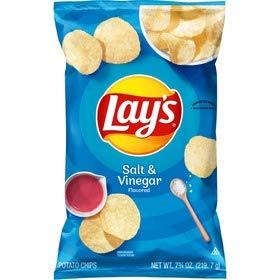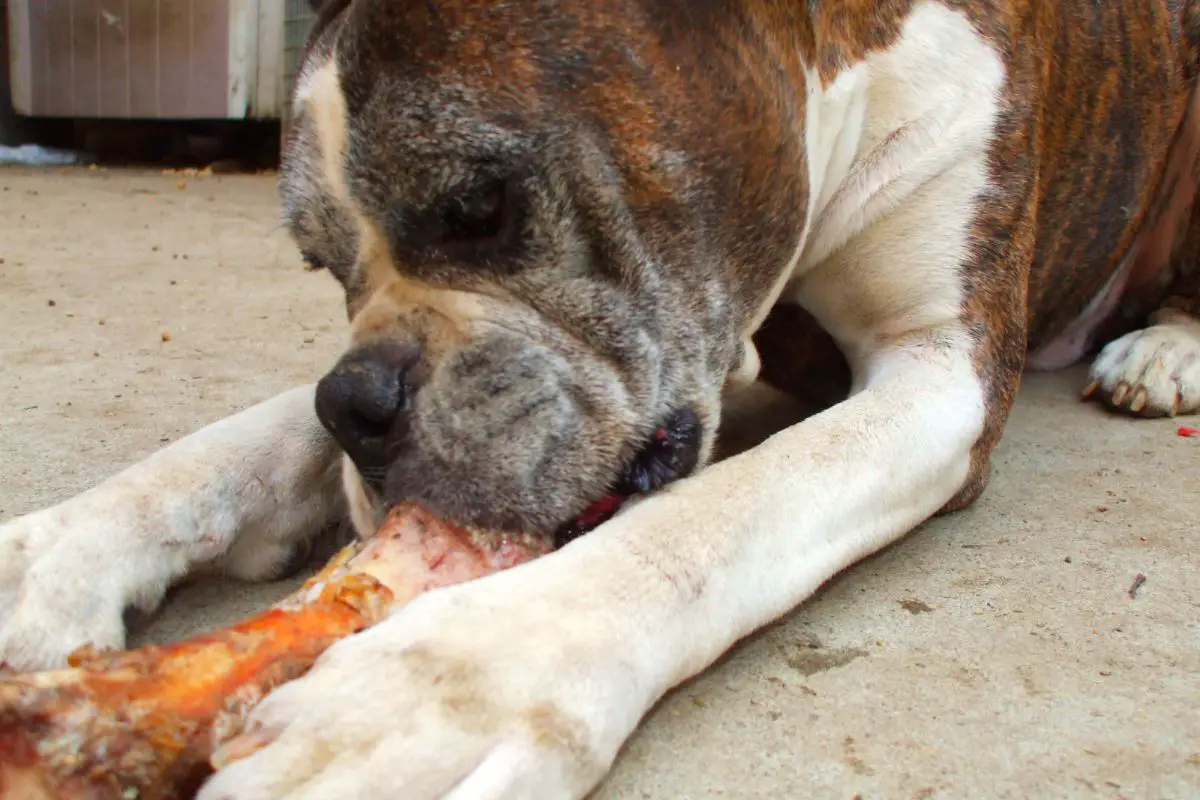This post contains affiliate links.
As a dog parent, it is hard to resist giving in to the temptation of feeding your dog table food when he pleads and begs. Although a dog will usually eat whatever you give him (and is especially interested in human food), it doesn’t mean your favorite snacks, such as salt and vinegar chips, are the healthiest option for him.
Dogs shouldn’t eat salt and vinegar chips because the chips are high in salt and can cause adverse effects in dogs, such as dehydration or vomiting. While you can feed your dog the occasional salt and vinegar chip, it’s vital not to overdo it, as even a small amount can lead to health complications.
It is rather tricky saying no to your dogs when he pleads and begs. But, you also have to maintain balance for his health. Read on to find out why you shouldn’t give your dog salt and vinegar chips and how you can do so in moderation if you absolutely can’t resist the puppy eyes.
Why Dogs Shouldn’t Eat Salt and Vinegar Chips
It is a common habit to share your snacks with your dogs, especially when they look at you with soulful, pleading eyes. Unfortunately, salt and vinegar chips contain salt, vinegar, and artificial food additives that are not healthy for dogs.
First, we must evaluate these ingredients individually to see the effects they have on dogs.
Too Much Sodium Can Impact Dogs’ Internal Organs
Salty foods are not ideal for dogs and can lead to a series of health problems. Like humans, the average dog also has a recommended daily salt intake of 200 mg (0.007 oz), and a bag of chips has 170 mg (0.006 oz) of salt.
Excessive salt intake can cause sodium ion poisoning in your dog. It can also cause dehydration, forcing their kidneys to work overtime. Most pet owners know that dehydration can damage a dog’s kidneys in the long run.
Excessive intake of salt can also lead to severe neurological damage. This occurs when the cells in dogs’ bodies begin to release water to lower the salt levels. When this happens, their brain cells start to deteriorate, causing them to dry out due to the lack of water.
Consequently, their muscles will also begin to lose moisture, and experts say that moistless muscles will stiffen and shrivel out.
Some of the most prevalent symptoms of sodium ion poisoning in dogs include:
- Vomiting
- Excessive urination
- Diarrhea
- Seizures
- Heart damage
- Lethargy
- Abnormal fluid accumulation
- Brain swelling
- Loss of appetite
Excessive Vinegar Exposes Dogs to High-Level Acids
Vinegar is generally safe when consumed in small quantities. However, If you are giving your dog vinegar for the first time, you can check his reaction to vinegar by mixing a small amount in their food. Watch out for any negative reactions. If there are none, you can gradually increase the portion until you are satisfied with the quantity of vinegar intake that your dog is getting.
Some veterinarians even recommend using apple cider vinegar in moderation because it can be beneficial to your dog’s skin and fur, and overall health. If you doubt the correct quantity, we recommend checking in with your veterinarian first to know what’s suitable for your dog.
When consumed excessively, vinegar exposes your dog to high-level acids, causing the following symptoms:
- Gastrointestinal problems
- Bleeding
- Excessive thirst
- Vomiting
- Diarrhea
- Heartburn
- Skin itching
Some Artificial Food Additives Are Toxic to Dogs
Salt and vinegar chips are loaded with artificial flavors, oils, and sugars, which are very toxic to dogs and can cause different internal issues. While small quantities may not be so bad, it’s often difficult to know what quantity of artificial food additives will be too much for your dog. Some of the conditions that consumption of artificial food vinegar can leave your dog prone to include;
- Gastrointestinal irritation
- Vomiting
- Weight gain
Can Dogs Eat Salt and Vinegar Chips in Moderation?
Since these individual ingredients are not generally healthy for your dog, it’s easy to predict that combining them in one meal will not be beneficial as well. However, we’ve also discussed that most of the adverse effects of these ingredients come from excessive consumption.
Dogs can eat some salt and vinegar chips in moderation, although it is safer to avoid feeding them to your dog altogether. If you can practice careful moderation, you can feed your dog the occasional salt and vinegar chip without worry.
Let’s review some tips you can follow to predict the right amount of salt and vinegar chips for your dog:
Practice Feeding in Moderation
The first key to knowing what will be suitable for your dog is moderate consumption. Of course, one chip every once in a while will not necessarily hurt them. The real issue arises when you feed him a handful regularly. It is essential not to get distracted while throwing him this snack. Yes, he may beg for more, but it’s up to you to apply moderation, so he doesn’t get too much.
Enforce Training Techniques
Dogs are malleable and will follow routines and obey instructions. For example, during snack time, you can feed them one chip and give them instructions indicating that they can’t have more. Over time, they will become accustomed to this and will not beg anymore after one chip. You can also train your dog to avoid eating any chips from the floor or other careless locations.
Pay Attention to Your Dog’s Reactions
Even after your dog has been trained to eat just one chip without begging, it is crucial to pay close attention to see whether his reaction to the chips may change over time. If you notice any symptoms of vomiting, dehydration, nausea, excessive urination, etc., it is time to stop feeding them for a couple of weeks. Cutting out the chips will help you ascertain whether the symptoms are a result of the snack.
What To Do if Your Dog Eats Too Many Chips
So far, we’ve established that consuming excessive amounts of salt and vinegar chips can harm your dog. However, most dog owners do not know what to do when the chips begin to cause unpleasant symptoms, especially when a veterinary clinic is very far away. When this happens, do not panic; instead, take the following procedures:
- Provide plenty of fresh drinking water for your dog. The water will dilute their system and cleanse the harmful substances out through urine.
- Take the dog to the vet, where he would likely be admitted for professional but gradual reduction of the excess levels.
- Follow the vet’s instructions carefully and go for follow-up checks regularly.
- Prepare a bland diet that is low in sodium. You can cook chicken breast without the bones and skin and feed the broth to your dog. You can also incorporate cooked, plain rice as well.
Dog-Safe Alternatives to Salt and Vinegar Chips
While bonding with your dog is essential and usually, several human foods such as chocolate, unbaked bread dough, alcoholic beverages, etc., are toxic to dogs.
The best time to bond with your dog is over a shared snack and curled up on the couch; it is also crucial that your dog gets the best of this experience with healthy snacks. Since the general idea is for your dog to have something crunchy that would look remotely close to the salt and vinegar chips you are eating, you can try these homemade options as substitutes.
Popcorn
Plain, unbuttered, and unflavored popcorn is suitable for your dog in small quantities and is a practical alternative to salt and vinegar chips. Air-popped popcorn is packed with nutrients such as magnesium, zinc, manganese, phosphorus, fiber, and small amounts of vitamins. Apart from the numerous nutritional ingredients in popcorn, dogs can also chew on popcorn as regular snacks. Many dogs like popcorn, so it’ll be easy incorporating it into their daily diets.
Plain Potato Chips
You can also replace salt and vinegar chips with just plain, unsalted, and unflavored potato chips. Your dog wouldn’t know the difference. Sweet potato chips are equally as healthy and packed with vitamins A, B6, C, D, K and minerals such as iron, magnesium, and potassium. Sweet potatoes are a healthy source of beta-carotene, which protects their cells from damage and dietary fiber.
To make potato chips:
- Wash and peel the skin off the potatoes.
- Cut into thin round slices and sprinkle olive oil or cinnamon (optional).
- Preheat the oven to 300°F (148.89°C).
- Line trays with parchment paper and place potato slices.
- Bake for 25 minutes.
- If chips are not ready, lower the temperature to 200°F (93.33°C) and bake for another 10 minutes.
- Check regularly to avoid burning.
- Seal and store in airtight containers.
Homemade Apple Chips
The idea is to give your dogs something closely related to yours, and they wouldn’t know the difference. Apples are generally healthy for dogs and contain vitamins A and C. They’re also filled with fiber and antioxidants. You can add cinnamon to add taste (make sure you use only pure cinnamon that does not contain nutmeg, which can be toxic to dogs).
To make apple chips:
- Cut the apple into thin slices and sprinkle cinnamon.
- Preheat the oven to 200°F (93.33°C).
- Bake for 30 minutes, flip over and bake for another 30 minutes.
- Seal and store in airtight containers.
Homemade Banana Chips
Bananas are packed with potassium, vitamin B6, vitamin C, and fiber. All these ingredients are pretty beneficial to your dog. However, the excess content of sugar in bananas can make them harmful to your dog’s health when served everyday.
However, making a chip out of it once in a while for your dog will not be wrong. You can also add a little coconut oil to your chips to make them extra tasty. There are different ways to make tasty banana chips, however, not all of them are healthy for your dog. Here are some recommended steps that always work for me.
To make banana chips:
- Slice a banana into small pieces.
- Sprinkle banana pieces with coconut oil.
- Preheat the oven to 250°F (121.11°C) and line trays with parchment paper.
- Bake bananas for 90 minutes, flip over and bake again for an additional 30 minutes until crisp.
- Seal and store in airtight containers.
Homemade Beets Chips
Beets are packed with vitamin C, potassium, iron, fiber, and folic acid and are also low in calories and fats. Although beets are a good source of healthy nutrients for dogs, they also have high amounts of sugar, and you should only feed them to dogs now and then.
To make beets chips:
- Wash beets thoroughly and slice them into small pieces.
- Preheat the oven to 350°F (176.67°C).
- Line baking trays with parchment paper and place beets slices.
- Bake for 35 minutes until the chips begin to curl and allow to cool.
- Seal and store in airtight containers.
Conclusion
It is pretty challenging to say no to your dog when he wants something. However, it is crucial to balance “wanting to please your dog” with “keeping it healthy.” Salt and vinegar chips in moderation now and then will not cause any severe damage, and you and your dog can occasionally indulge while bonding.
However, you can easily make many healthy and crunchy alternatives at home for your dog to replace salt and vinegar chips. Feed your dog one of my recommended alternative snacks that resembles your chips, and you and your dog will be equally satisfied.
Related Articles
- Can Dogs Eat Molasses? (We Find Out)
- Can Dogs Eat Mulberries? (We Find Out)
- Can Dogs Eat Jello? (We Find Out)
- Can Dogs Eat Lemongrass? Let’s Find Out!
- Can Dogs Eat Mayo? (We Find Out)
Sources
- Spoon University: 5 Reasons Dogs Love Food
- Wag!: Salt Poisoning in Dogs
- WikiHow: How to Use Apple Cider Vinegar for Dogs
- ResearchGate: Toxicity of Food additives
- ECU: Canine Aggression
- WebMD: Water and Your Dog’s Health
- NCBI: Household Food Items Toxic to Dogs and Cats
- VCA: Obesity in Dogs
Mrdogfood.com is a participant in the Amazon Services LLC Associates Program, an affiliate advertising program designed to provide a means for sites to earn advertising fees by advertising and linking to Amazon.com. We also participate in other affiliate programs which compensate us for referring traffic.






